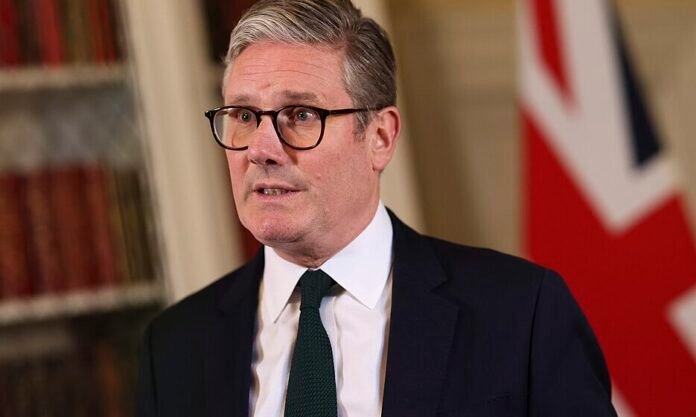PM retreats after Labour MPs revolt over disability cuts, offering costly concessions to win vote
Keir Starmer has made a dramatic climbdown on his flagship welfare reform bill, offering major concessions worth billions in a last-ditch attempt to avoid a damaging Commons defeat next week.
Facing rebellion from more than 120 Labour MPs, the prime minister authorised emergency talks that resulted in the watering down of key disability benefit cuts and new protections for existing claimants. The move, which reverses weeks of defiance, is expected to save the bill at its second reading on Tuesday.
The government has now agreed to apply controversial cuts only to new benefit applicants, and to launch a formal consultation on changing disability assessment criteria. Those already receiving payments will retain their entitlements.
Senior rebels said the climbdown was “massive” and enough to avert a public rupture. “We always wanted to protect the most vulnerable, not destroy the bill,” one said. “We hoped for an off-ramp — and that’s what this is.”
The shift will come at a heavy cost to the Treasury. Rebels estimate the changes could add up to £8bn to spending over the next three years. Rachel Reeves, already under pressure to fund a reversal of winter fuel payment cuts, may now be forced to raise taxes to plug the widening fiscal gap.
The compromise follows days of tense negotiations led by Starmer’s chief of staff, Morgan McSweeney, alongside Angela Rayner and her team. On Wednesday night, Starmer and Reeves personally signed off on the offer, despite having insisted for weeks that no changes would be made.
The revolt had already claimed one frontbench resignation, with more threatened if a deal wasn’t reached. Downing Street now concedes that the bill’s presentation was mishandled, with internal sources admitting they focused too much on budget savings rather than moral reform.
Under the new agreement:
- Cuts to disability benefits will affect only new claimants.
- A £1bn employment support fund will be brought forward this year, with billions more promised across the parliament.
- Disability groups will be formally consulted on any future changes to eligibility.
- Ministers are reviewing calls to unfreeze the health-related element of Universal Credit, which has not kept pace with inflation.
The welfare overhaul, initially pitched as a way to reduce the £4.8bn annual bill, has become a flashpoint within Labour. Critics, particularly on the backbenches, accused Reeves and welfare secretary Liz Kendall of sidelining vulnerable people to meet strict fiscal targets.
Embed from Getty ImagesCommons analysis showed that those with long-term or terminal conditions would have lost up to £250 by 2029 if inflation-linked rises weren’t restored. The government is now re-evaluating that policy amid growing pressure.
Starmer sought to frame the U-turn as collaborative policymaking. “There’s consensus across the House on reforming welfare,” he told reporters. “I want to get this right, with the support of colleagues from all sides.”
However, his authority has taken a hit. The welfare reversal follows similar backtracks on winter fuel payments and the surprise announcement of a grooming gang inquiry during a flight. Starmer’s personal approval rating has slipped to -36 since his election victory.
Some MPs remain uneasy about McSweeney’s influence and believe Rayner has been critical in restoring fragile backbench relations. Others now expect Labour’s campaign to end the two-child benefit cap to intensify — a policy Starmer says he supports in principle but cannot yet afford. Scrapping the cap would cost over £3bn annually.
For now, the welfare rebellion appears defused. But Starmer, just a year into office, finds himself already battling discontent from within.
BBC
The UK government has confirmed a major retreat on its controversial welfare reforms, bowing to pressure from over 100 Labour backbenchers. Work and Pensions Secretary Liz Kendall announced that existing claimants of Personal Independence Payment (PIP) and the health element of Universal Credit will be spared cuts—changes will now apply only to future applicants.
Facing the threat of defeat, Prime Minister Keir Starmer made personal appeals to Labour MPs on Thursday, eventually securing enough support for the bill to survive a Commons vote next week. A planned £1bn support scheme, previously delayed until 2029, will also be fast-tracked.
Dame Meg Hillier, who led opposition to the bill, said she would now back it, citing protection for the vulnerable and the inclusion of disabled voices in future benefit design. Despite this, some MPs like Peter Lamb remain opposed, calling the climbdown “insufficient” and urging alternative reforms.
The concessions virtually guarantee the bill’s passage.
SKY NEWS
The UK government has confirmed major concessions to its controversial welfare reforms, averting a rebellion by over 120 Labour MPs. The flagship Universal Credit and Personal Independence Payment (PIP) Bill, which aimed to cut £5bn by 2030, will now spare existing claimants. Changes to PIP eligibility and Universal Credit health payments will only apply from November 2026 and affect new applicants.
Work and Pensions Secretary Liz Kendall assured MPs that current PIP recipients will retain their support, safeguarding 370,000 people. Additionally, those meeting severe conditions criteria under Universal Credit will have income levels protected in real terms. This last-minute U-turn, costing at least £1.5bn, follows intense lobbying by Labour backbenchers and has secured support from some leading rebels, including Meg Hillier.
Despite the shift, prominent left-wing MPs such as Diane Abbott and Richard Burgon remain opposed. Conservatives slammed the retreat as a “screeching U-turn” and warned of fiscal irresponsibility.
